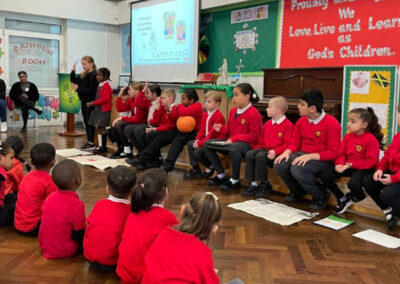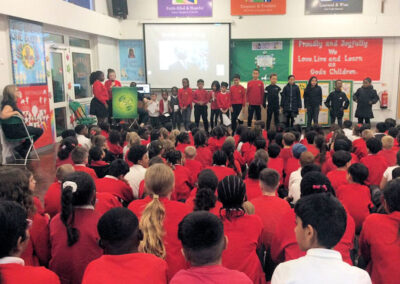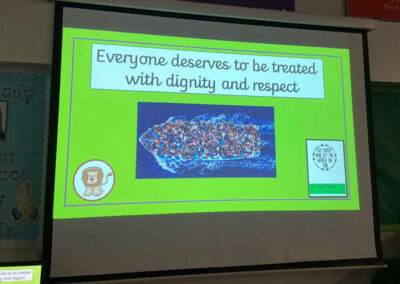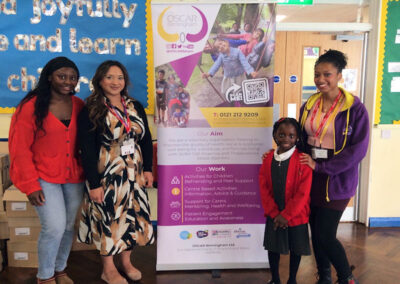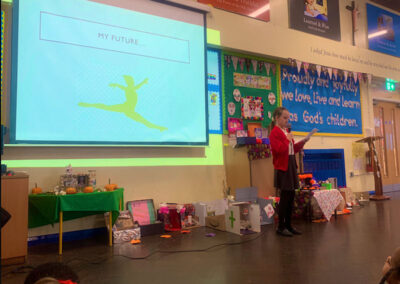Anti-Bullying
Statement of Intent
At St. Mark’s Catholic Primary School, we are committed to providing a caring, friendly and safe environment for all our children so that they can learn and grow in a relaxed and supported atmosphere underpinned by Gospel values.
Living together as God’s children, we love and serve each other, regardless of our faults or our differences. We want every child to learn that they are capable of great things, and we want them to achieve academic excellence, in a community of faith. We want every child to feel prepared for their next phase of education, so that they confidently share their faith, their gifts, and the good news for the greater good.
We recognise that in order for our children to be able to achieve their God-given potential, we must ensure that children understand what bullying is, including the forms bullying can take, and the impact this can have on others and ourselves. Children are encouraged to tell any adult if they feel they are experiencing bullying or if they believe they have witnessed a form of bullying.
Regular assemblies take place which focus on bullying issues and the means of dealing with them. We are committed to educating our children about bullying behaviour, so they understand what it is, how to identify it and its effects, and how to report it.
We believe that bullies are not wholly responsible for their behaviour and need support, as do the victims of this behaviour. We endorse that bullying is not and never will be accepted at St. Mark’s and therefore strive with aid of children, staff and parents to deal successfully and quickly with any issues that arise.
What is Bullying?
Many experts say that bullying involves an imbalance of power between the perpetrator and the victim. This could involve perpetrators of bullying having control over the relationship which makes it difficult for those they bully to defend themselves. The imbalance of power can manifest itself in several ways, it may be physical, psychological (knowing what upsets someone), derive from an intellectual imbalance, or by having access to the support of a group, or the capacity to socially isolate. It can result in the intimidation of a person or persons through the threat of violence or by isolating them either physically or online. Low-level disruption and the use of offensive language can in itself have a significant impact on its target. If left unchallenged or dismissed as banter it can also lead to reluctance to report other behaviour. Early intervention can help to set clear expectations of the behaviour that is and isn’t acceptable and help stop negative behaviours escalating.
Taken from the document, ‘Preventing and Tackling Bullying’ by the Department for Education (2017)
Our School Motto
Lend a HAND, take a STAND, STOP BULLYING NOW!

Our Approach
We are all committed to providing a caring, friendly, respectful and safe learning environment for all of our pupils. We promote an inclusive, Catholic ethos that focuses on respecting one another and celebrating difference and diversity.
Bullying and prejudice-based language of any kind, involving pupils, adults towards pupils, staff or parents are unacceptable and will not be tolerated at St. Mark’s.
We understand the devastating and lasting effect being bullied can have on some children and we are committed to dealing with all incidents equally seriously, quickly and effectively, whether it has taken place in or outside of school.
Preventing and tackling bullying is part of our work to support pupils’ social, moral, spiritual, cultural and emotional development at St. Mark’s. If bullying does occur, all pupils should be able to tell and know that incidents will be dealt with promptly and effectively. We are a TELLING school here at St. Mark’s. This means that anyone who knows that bullying is happening is expected to tell the staff. All members of staff receive safeguarding training in school annually.
However, very often, children and young people are reluctant to tell adults that they’re being bullied. This might be because they are scared of an over-reaction, they don’t want to burden parents/carers if there are other things going on in the family, they’re embarrassed, or they are worried that telling might make the situation worse.
But there are a number of things you can look out for if you’re concerned your child is being bullied. Potential signs are:
- They become withdrawn
- They have scratches and bruises that can’t really be explained
- They don’t want to go to school or they are having trouble with school work
- They don’t want to go out or play with friends
- Their online behaviour changes
- Changes to how and when they’re using their mobile
- Changes are made in the route they take to school
- They complain of headaches, stomach aches and other pains
- They become easily upset, tearful, ill-tempered or display other out-of-character behaviour
Staff are always alert to signs of bullying – for example – deterioration in a child’s work, significant change in a child’s well-being, reluctance to go out at playtime, tearfulness and/or a reluctance to come to school. Every effort is made to find the underlying cause and to deal with it effectively. (The best interests of the child must be a top priority in all things that affect children. RRSA Article 3)
How we deal with bullying at St. Mark’s
Children at St. Mark’s learn about bullying through the curriculum. In particular, the catholic social teaching objectives and the RHSE and safeguarding curriculum, support children to recognise the signs of bullying and understand why we do not tolerate this behaviour at St. Mark’s and in society. We also encourage children to have confidence in themselves to report any kind of poor behaviour or bullying as we know confidence and self-esteem are crucial to every child’s development.
We also participate in the annual campaign of ‘Anti-bullying Week’ that happens every year in the Autumn term. All school staff receive training on recognising the potential signs of bullying and children are encouraged to speak to school staff in the first instance if they witness or are a victim of any bullying.
At St. Mark’s, we raise the awareness and understanding of bullying behaviour through the curriculum. This includes:
- School assemblies
- Activities planned and lead by the Guardian Angel Mission Team
- Citizenship activities
- Circle time
- RE – focus on respect and dignity of individual
- Workshops from outside professionals
- Pupil voice groups discuss and review anti-bullying strategies in school
- Use of questionnaires
At St. Mark’s we also encourage and support children to share their personal stories so that children can gain important knowledge and understanding of the differences that make us all unique. These assemblies are very powerful as children confidently articulate in front of the whole school their story.
You can find out more information about anti-bullying at St. Mark’s by reading our policy on anti-bullying. You will find this on our Policies and Documents page.
Further support for you as parents about bullying can be found on the following websites:
Our Guardian Angels
Read about our Guardian Angels on our Mission Teams page.
You can also read more about the work our Guardian Angels do in school in the Autumn 2024 edition of our Safeguarding Newsletter.



